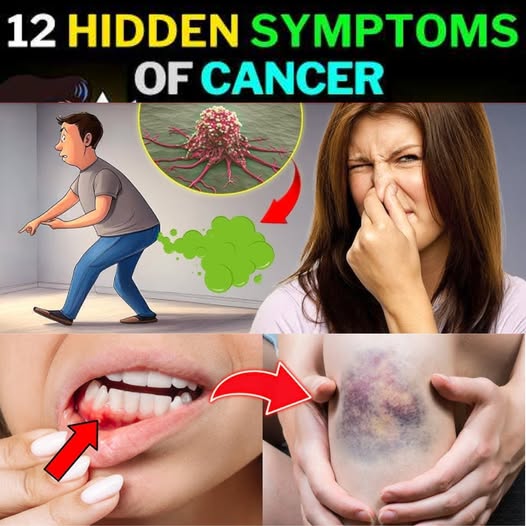Introduction:

Cancer is Silent—Until It’s Not. Are You Missing the Early Signs?
Every minute counts when it comes to cancer. Detecting it early can be the difference between life and death. But here’s the problem: cancer often whispers before it screams. Subtle symptoms may seem harmless at first—easy to dismiss, easy to ignore. But those “little things” could be your body waving a red flag.
In this comprehensive guide, we break down 12 early cancer warning signs you absolutely should not ignore. Whether you’re monitoring your own health, caring for a loved one, or simply staying informed, this list could save a life. Backed by medical insights and statistics, these signals deserve your attention now—not later.
Body:
1. Unexplained Weight Loss
Sudden weight loss—especially more than 10 pounds without changing diet or activity level—can be alarming.
Why it matters:
According to the American Cancer Society, this is often the first noticeable sign of cancers such as pancreatic, stomach, esophageal, or lung cancer. Tumors can affect your metabolism and suppress appetite.
What to do:
See a doctor if you experience rapid weight loss without reason. Blood tests and imaging can rule out or confirm underlying issues.
2. Persistent Fatigue That Won’t Go Away
Feeling tired after a long day is normal. But extreme, ongoing fatigue—despite rest—is not.
Cancer connection:
Fatigue is a common symptom of leukemia, colon cancer, or stomach cancer, where blood loss (even internal and unseen) can lead to chronic tiredness.
Take action:
Track your energy levels. If daily tasks leave you drained for weeks, consult a physician for further evaluation.
3. Persistent Cough or Hoarseness
Don’t ignore a dry cough or hoarseness that lasts longer than 3 weeks.
Why it matters:
It could indicate lung cancer, throat cancer, or thyroid cancer. A chronic cough, especially when accompanied by blood, demands immediate attention.
FAQs Answered:
- Is a smoker’s cough different? Yes. Smokers may dismiss it, but a changing or worsening cough needs urgent review.
- Can allergies cause hoarseness? Occasionally. But if hoarseness persists without allergy symptoms, get checked.
4. Changes in Skin or Moles
Your skin is your largest organ—and an excellent health monitor.
Key indicators:
- New mole or growth
- Changes in size, color, or shape of existing moles
- Sores that won’t heal
- Dark streaks under nails
Risk alert:
Melanoma, the deadliest skin cancer, is often treatable if caught early. The ABCDE rule (Asymmetry, Border, Color, Diameter, Evolving) is your guide.
What to do:
Perform monthly skin checks. Visit a dermatologist annually—even more often if you have a history of sunburn or tanning bed use.
5. Changes in Bowel or Bladder Habits
Sudden changes in digestion or urinary function may indicate something deeper.
Colon or bladder cancer signs include:
- Blood in stool or urine
- Unexplained diarrhea or constipation
- Narrow stools
- Frequent urge to urinate or trouble starting
Note:
Blood isn’t always red. Dark, tarry stools can signal internal bleeding—seek help immediately.
6. Pain That Won’t Go Away
Persistent pain—whether dull or sharp—deserves a closer look.
Pain can indicate:
- Bone cancer (aching in limbs)
- Brain tumors (persistent headaches)
- Ovarian cancer (pelvic or back pain)
Pro tip:
If over-the-counter medications don’t touch it—or it disrupts sleep—it’s time for deeper investigation.
7. Lumps or Swellings
A new lump or swelling anywhere on your body should never be ignored.
Especially important:
Check neck, armpits, breasts, groin, and testicles. Many cancers (like lymphoma, breast cancer, or testicular cancer) present as painless lumps.
Remember:
Painful or not, if it’s new or growing, get it evaluated.
8. Difficulty Swallowing
Struggling to swallow, or the sensation of something “stuck” in your throat, is not just a nuisance.
Potential cancers:
Esophageal or throat cancer. Early intervention is critical, as these cancers often progress quickly.
Act fast if:
You’re also experiencing weight loss, heartburn, or pain when eating.
9. Unusual Bleeding or Discharge
Unexpected bleeding is one of the most serious warning signs.
Examples include:
- Vaginal bleeding after menopause (uterine or cervical cancer)
- Bleeding between periods
- Coughing up blood (lung cancer)
- Blood in urine (kidney or bladder cancer)
Don’t delay:
While not all bleeding indicates cancer, early diagnostics can make a lifesaving difference.
10. Persistent Bloating
Occasional bloating is common, especially after meals. But bloating that lasts more than two weeks can be a red flag.
Associated cancers:
Ovarian, pancreatic, or stomach cancer.
Symptoms that raise alarm:
- Feeling full quickly
- Pelvic pain
- Weight changes
Bloating + digestive issues = doctor visit. Don’t let it linger.
11. Night Sweats or Fever Without Cause
Your body is trying to tell you something when you have repeated, unexplained fevers or night sweats.
Possible causes:
Cancers like leukemia or lymphoma. These symptoms often show up before diagnosis, especially if accompanied by fatigue or swollen lymph nodes.
Hot tip:
Track your temperature daily. A recurring low-grade fever or drenching night sweats warrant testing.
12. Unhealing Sores or Oral Changes
A sore that won’t heal—especially in the mouth or on the tongue—can be an early sign of oral cancer.
Look out for:
- White or red patches
- Persistent mouth pain
- Loose teeth or jaw pain
- Difficulty chewing
Who’s at risk?
Smokers, drinkers, and HPV-positive individuals are at higher risk. Regular dental exams are your first defense.
Key Stats That Should Wake You Up:
- 1 in 2 men and 1 in 3 women in the U.S. will be diagnosed with cancer in their lifetime (American Cancer Society).
- 5-year survival rates improve drastically when cancers are caught early. For instance, early-stage melanoma has a 99% survival rate—but drops sharply if found late.
- More than 30% of cancer deaths are due to late diagnosis and avoidable risk factors.
FAQs on Early Cancer Symptoms:
Q: Can cancer symptoms come and go?
A: Yes, especially early on. But recurring or cyclical symptoms should still be checked out.
Q: Are early signs of cancer painful?
A: Not always. Many early cancers are silent and painless. That’s what makes them dangerous.
Q: Should I panic if I have one of these symptoms?
A: No. These signs can be caused by benign issues—but consulting a doctor is crucial for peace of mind and early intervention.
Q: How often should I get screened?
A: It depends on age, family history, and lifestyle. Common guidelines:
- Mammograms: Women 40+ every 1–2 years
- Colonoscopy: Age 45+ every 10 years
- Pap smear: Women 21–65 every 3 years
- PSA test (prostate): Age 50+ (or earlier for high-risk)
Conclusion: Don’t Wait for a Crisis—Act on the Clues
Cancer doesn’t start with a bang. It begins with whispers—small, seemingly insignificant symptoms that quietly escalate. That’s why early detection is your most powerful weapon.
By staying alert to these 12 early cancer warning signs, you’re not just protecting yourself—you’re also empowering loved ones to live longer, healthier lives. Don’t be passive. Don’t dismiss what your body is trying to tell you.


